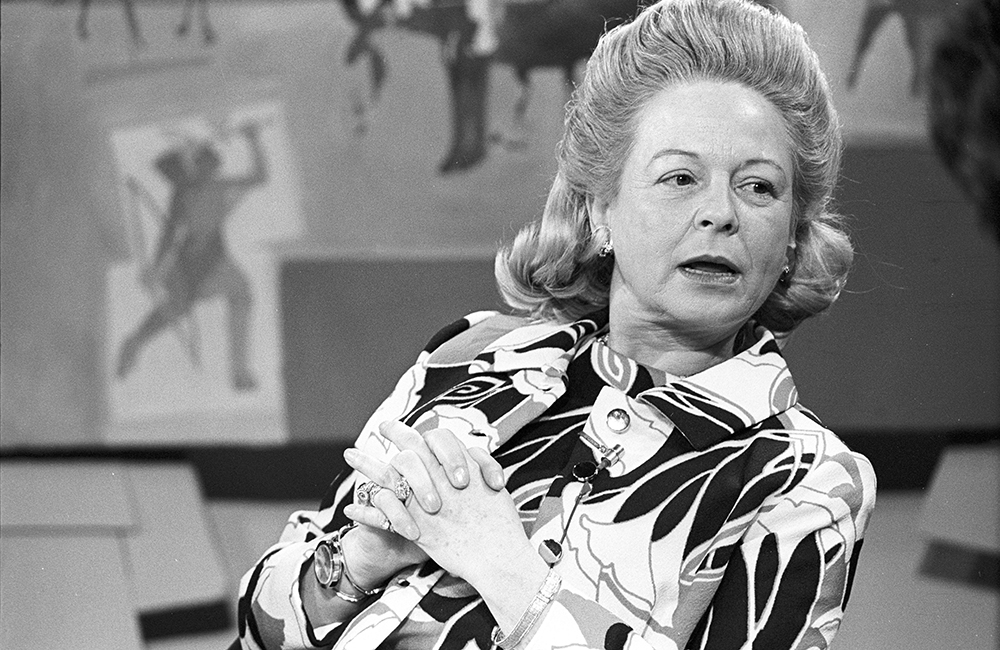Communication Arts alums are known for making big strides in the world of media and film – and Debra McClutchy is no exception. In fact, the documentary that she co-directed was recently nominated for an Academy Award for Best Documentary Short Film!
Built from archival footage, The Martha Mitchell Effect explores an important figure in the Watergate scandal: Martha Mitchell, the wife of a Republican Cabinet member and a key whistleblower. We sat down with Debra to learn more about the documentary, her role in bringing Martha Mitchell’s story to life, and her time studying Communication Arts at UW-Madison.
Congratulations on your Oscar nomination for The Martha Mitchell Effect! Can you tell us a little more about the documentary and what inspired it?
Thank you! The Martha Mitchell Effect is a short documentary about Martha Mitchell, a Cabinet wife who spoke out during Watergate — and the Nixon administration’s campaign to gaslight her into silence. It’s an archival short documentary that prioritizes the voice of this hidden figure Martha Mitchell and immerses you in the world of the Watergate scandal through a new lens. Watergate has long been told only via “all the president’s men.” We were excited to resurrect Martha’s incredible story and insert her back into her rightful place in the Watergate narrative.
I’d love to hear more about your role as co-director. How did you come to be involved in creating this documentary?
My friend and directing partner Anne Alvergue and I have a long track record working in film. She’s an editor by day, and I had been working in production and most recently film distribution. Anne and I also follow politics closely and were pretty devastated by the 2016 election. We were looking for a story to tell about a strong female character, and when we first heard Martha’s story we were floored. We couldn’t believe we had never heard of her before. We became totally fascinated and looked for a documentary about her to learn more, but there wasn’t one. After finding some incredible clips of her on Youtube, we were so excited. We decided to take the leap and make a documentary ourselves. We started to research and develop the film in 2019…and here we are!

A still from “The Martha Mitchell Effect.” Photo by Brad Huffman.
What did it look like to get this film made and what decisions did you have to make about the research, production, etc.? How do you think your background in Comm Arts might have contributed?
My background in Comm Arts laid the groundwork for everything in my film and TV career. I learned so much from my professors like JJ Murphy and Laura Kipnis and others like Erik Gunneson. And I learned even more by working with other students and just making stuff. The more you experiment with story-telling and filmmaking, the more you gain confidence.
As far as The Martha Mitchell Effect film, Anne and I both love archival documentaries and shared an artistic vision from the start. We knew we wanted to make an archival film to immerse the viewer in early 1970s Watergate. And we just love the look of film and TV as a medium from back then. That meant taking a deep dive into research, and we scoured the internet, archives, universities, libraries, and more to find interviews and footage of Martha and others. Our primary source was the Nixon Library, and the archivist there Ryan Pettigrew was an incredible resource for us. Although we started in 2019, much of the research and production took place during the pandemic. We recorded new audio interviews over Zoom with primary subjects like John Dean and others who knew Martha Mitchell so we could provide context and color to the story. I’ll also add that in 2020 we brought on two incredible producers, Beth Levison and Judith Mizrachy, who were invaluable in helping us get the film made. With their help, we also secured our deal with Netflix. We also had an amazing art director Matt Eller, and an equally amazing composer Nathan Halpern, as well as an ace archival producer Susan Johnson. The film was a total team effort.
Can you tell us a bit about your time at UW-Madison? How did your time here shape your career and your work as a filmmaker?
Not only is UW-Madison an incredibly fun place to go to college, but it also opened a creative and intellectual world that still informs me today. One of my absolute favorite things to do was go to Wisconsin Film Society screenings and films at the Memorial Union. This was way before streaming, so we really had to catch the films in person before they left town. My friends and I saw so many international and indie films in Madison. I loved the films and the whole cinema experience. I knew I had to work in film in some way, shape, or form. I’ll also say that some of my closest friends to this day are friends I met my freshman year. UW-Madison is just that kind of place!
What message do you have for our Comm Arts students?
To the budding filmmakers out there, find people to work with who lift you up and believe in and support each other. It’s so incredibly important. Creating a strong and sustainable community is everything.
You can watch The Martha Mitchell Effect on Netflix and follow the film on Twitter at @themarthafilm.